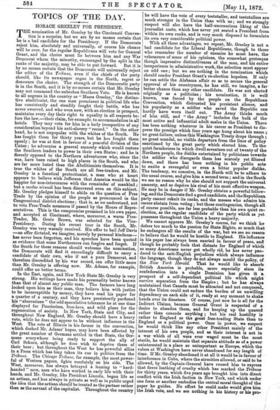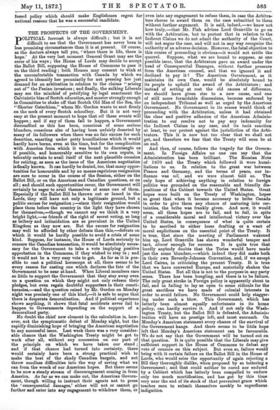TOPICS OF THE DAY.
HORACE GREELEY FOR PRESIDENT.
THE nomination of Mr. Greeley by the Cincinnati Conven- tion is a surprise, but we are by no means certain that he is a bad candidate for the Presidency. If the Democrats reject him, absolutely and universally, of course his chance will be over, for the regular Republicans will vote for General Grant, and the choice must lie between him and any War Democrat whom the minority, encouraged by the split in the ranks of the majority, may be able to put forward. But it is by no means certain that the Democrats will universally reject the editor of the Tribune, even if the chiefs of the party should, like its newspaper organ in the North, regret or denounce the choice. The strength of the Democratic party is in the South, and it is by no means certain that Mr. Greeley may not command the unbroken Southern Vote. He is known to all negroes in the country as "Massa Greeley," the distinc- tive abolitionist, the one man prominent in political life who has consistently and steadily fought their battle, who has never swerved, and who even now, with an election in prospect, maintains every day their right to equality in all respects be- fore the law,—their claim, for example, to accommodation in all hotels. They may vote for him in a body irrespective of any consideration beyond his anti-slavery "record." On the other hand, he is not unpopular with the whites of the South. He has fought them for thirty years, but he has fought them openly ; he was at first in favour of a peaceful division of the Union ; he advocates a general amnesty which would restore the Southern leaders to power in their own States ; and he is fiercely opposed to the Northern adventurers who, since the war, have been raised to high places in the South, and who are far more hated than the Abolitionists themselves. It is true the whites of the South are all free-traders, and Mr. Greeley is a fanatical protectionist, a man who at heart appears to believe with Jefferson that America would be the happier for non-intercourse with the remainder of mankind ; but a modus visendi has been discovered even on this subject. Mr. Greeley pledges himself to abide on the question of Free Trade by the opinion of the people as pronounced in the Congressional district elections ; that is, as we understand, not to veto Free-Trade measures if passed by the House of Repre- sentatives. This is the compromise promised in his own paper, and accepted at Cincinnati, where, moreover, a warm Free- Trader, Mr. Gratz Brown, was selected for the Vice- Presidency. During his recent tour in the South, Mr. Greeley was very warmly received. His offer to bail Jeff Davis —an offer dictated, we imagine, merely by personal kindness— has never been forgotten, and his speeches have been quoted as evidence that some Northerners can forgive and forget. If the South for these reasons should welcome the nomination, the Democrats will find it exceedingly difficult to carry a candidate of their own, who if not a pure Democrat, and therefore discredited by his war record, can offer little more than Mr. Greeley is offering now. Mr. Adams, for example, could offer no better terms.
In the East, again, and New York State Mr. Greeley is very strong. His writings have made his personality better known than that of almost any public man. The farmers have long looked upon him as their man, they believe him with justice to be incorruptible by money, they have read his paper for a quarter of a century, and they have persistently pardoned his "aberrations" the odd speculative tolerance he at one time displayed for Fourierism, free-love, and wild plans for the regeneration of society. In New York, State and City, and throughout New England, Mr. Greeley should have a heavy vote, while he does not appear to be without influence in the West. The vote of Illinois in his favour in the convention, which dashed Mr. Adams' hopes, may have been affected by the great number of Germans settled in that State, the Ger- mans everywhere being ready to support the ally of Carl Schurz, although he does wish to deprive them of their beer ; but throughout the West he has powerful allies in a Press which has long taken its cue in politics from the Tribune. The Chicago Tribune, for example, the most power- ful of Western papers, fights resolutely on his side. The West, moreover, has always betrayed a leaning to " hard- handed " men, men who have worked in early life with their hands, and Mr. Greeley, like President Lincoln, began life as an artisan, and has always in private as well as in public urged the idea that the artisan should be treated as the partner rather than as the servant of the capitalist. Throughout the country
he will have the vote of every teetotaller, and teetotallers are much stronger in the Union than with us ; and we strongly suspect will also have the half-unconscious liking of the journalist caste, which has never yet seated a President from within its own ranks, and is very much disposed to formulate its own very considerable political power.
With all these advantages, we repeat, Mr. Greeley is not a. bad candidate for the Liberal Republicans, though to those who remember the number of enemies he must have, the vehemence of some of his 'pinions, the somewhat grotesque though impressive distinctiveness of the man, and his entire inexperience in administrative work, the selection must appear an odd one ; but we see nothing in the nomination which should render President Grant's re-election hopeless. If only he can settle the Alabama affair so as to secure the general approval of his countrymen, he has still, we imagine, a far better chance than any other candidate. He was not elected originally as a politician ; his nomination, it is well known, was forced by the people on the Republican. Convention, which distrusted his persistent silence, an& his popularity as a soldier who saved the Republic cant hardly have worn itself out. The Army thinks much of him still, and "the Army" includes the bulk of the most active and influential adult males in the Union. There has been nothing whatever in his career as President to dis- perse the prestige which four years ago hung about his name ; no great failure, unless this Washington Treaty drops through ; no great scandal, no visible departure from the lines of policy sanctioned by the great party which elected him. To the quiet farmhouses in which dwell seventeen out of twenty of the Northern people, the dislike entertained by politicians towards. the soldier who disregards them has scarcely yet filtered down, and there has been nothing in his public acts. to excite a revengeful or even a bitter popular dislike.. The tendency, we conceive, in the North will be to adhere to the usual course, and give him a second term ; and in the South. we see no reason why he also should not support the universal amnesty, and so deprive his rival of his most effective weapon.. He may be in danger if Mr. Greeley obtains a powerful follow- ing, and the Democrats find a good candidate, and the Republican. party cannot reknit its ranks, and the masses who admire hiw career abstain from voting ; but those contingencies, though all. of course possible, are far less probable than his own quiet re- election, as the regular candidate of the party which as yet possesses throughout the Union a heavy majority.
We cannot approve Mr. Greeley's course, for we think he defers too much to the passion for State Rights, so much that he endangers all the results of the war, but we see no reason to believe that he would be hostile to England. His influence in his paper has always been exerted in favour of peace, and though he probably feels that distaste for England of which so many Americans never get wholly rid, he has never pan- dered to the anti-English prejudices which always influence the language, though they do not always mould the policy, of the .New York Herald. That he would like to absorb British America is probable, more especially since its confederation into a single Dominion has given it a. prospect of a self-dependent political life which might survive separation from the Empire ; but he has always. maintained that Canada must be attracted and not conquered,. that the Union could not endure the burden of an unwilling dependency on each side of it, ready at any moment to shake hands over its disasters. Of course, just now he is all for the Indirect Claims, because General Grant is suspected of a desire to abandon them, and for keeping up the quarrel rather than concede anything ; but his real hostility is rather to England as the great free-trading State than to England as a political power. Once in power, we suspect he would think like any other President mainly of the interest of his own people, and as their interest is not in a war which of all wars ever waged must be the most sterile, he would maintain that separate attitude as of a power uninterested in a place so unimportant as Europe, which the rulers at Washington have never abandoned for any length of time. If Mr. Greeley abandoned it at all it would be in favour of interference in Cuba, where the atrocities allowed, or said to be allowed, by the Captain-General have roused him to express that fierce loathing of cruelty which has marked the Tribune for thirty years, which five years ago brought him into direct conflict with the Irish faction in New York, and which under one form or another embodies the central moral thought of the paper he guides. No effort he could make would give him the Irish vote, and we see nothing in his history or his pro.
feesed policy which should make Englishmen regret for even into any engagement to refuse them, in case the Arbitra- national reasons that he was a aucceesfal candidate. tors choose to award them on the case submitted to them



































 Previous page
Previous page